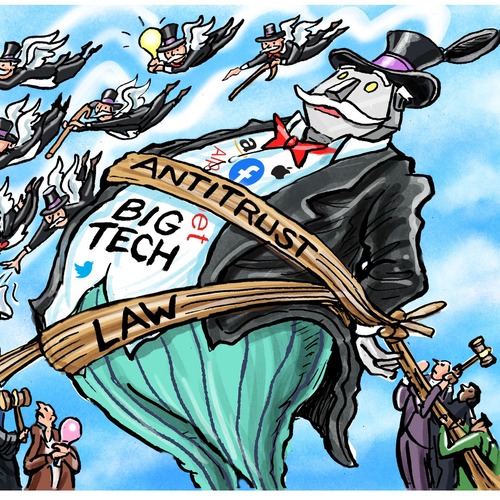Tech Giants and Antitrust Issues: A Comprehensive Analysis
In today’s rapidly evolving digital landscape, the dominance of tech giants like Google, Apple, Facebook, Amazon, and Microsoft has raised significant concerns over market competition, consumer rights, and the concentration of economic power. These companies, often referred to as “Big Tech,” hold substantial influence over industries ranging from e-commerce and social media to cloud computing and artificial intelligence. As these tech companies continue to grow in power, antitrust concerns have become increasingly relevant. This article explores the key antitrust issues surrounding tech giants, examining the benefits, challenges, and examples of cases that have shaped the ongoing debate.
Understanding Antitrust Law

Antitrust laws, also known as competition laws, are designed to prevent monopolies and ensure fair competition in the market. These laws prohibit business practices that harm consumers or stifle competition, such as price-fixing, predatory pricing, or mergers that would reduce market competition. The goal of antitrust regulation is to foster an environment where innovation can thrive, consumers have choices, and businesses compete on a level playing field.
For tech companies, antitrust issues often arise from their dominance in certain markets, the potential to manipulate market behavior, and the risk of undermining competition through aggressive business strategies. Given the vast reach of companies like Google and Amazon, the need for stringent regulation has never been more pressing.
The Benefits of Antitrust Regulation
1. Promotes Fair Competition
Antitrust laws help maintain competitive markets, preventing large companies from unfairly dominating smaller competitors. This promotes innovation, which leads to better products and services for consumers. For example, in the tech industry, antitrust regulations can prevent a monopoly that might otherwise suppress new startups or innovative ideas that challenge the status quo.
2. Protects Consumer Interests
When companies gain too much control over a market, they may have the power to raise prices, reduce product quality, or limit consumer choices. Antitrust laws ensure that consumers benefit from lower prices, higher-quality products, and more choices. In industries like tech, where products and services often involve personal data, competition is also critical in maintaining privacy and security standards.
3. Encourages Innovation
A competitive market pushes companies to innovate continuously. When a dominant company faces significant competition, it is more likely to improve its products and services to stay ahead. For instance, the rivalry between Microsoft and Apple in the personal computing space has led to the rapid advancement of operating systems, user interfaces, and software applications.
4. Prevents Abuse of Power
When a company becomes too large and dominant, it can engage in anti-competitive behaviors, such as predatory pricing or exclusive deals that prevent competitors from entering the market. Antitrust laws protect smaller companies and ensure that the playing field remains level, preventing abuses of power.
Key Antitrust Issues Faced by Tech Giants

1. Market Dominance and Monopolistic Behavior
One of the primary concerns surrounding Big Tech is their ability to dominate entire markets. For instance, Google’s control over search engines is often cited as a classic case of monopolistic behavior. As of 2023, Google controls over 90% of the global search engine market. This dominance raises concerns that competitors might find it impossible to challenge Google’s market position, ultimately leading to a lack of choice for consumers and fewer opportunities for new players.
Moreover, Amazon’s dominance in e-commerce is another example of how a company can leverage its market power. Critics argue that Amazon’s aggressive pricing tactics and vast marketplace create an uneven playing field for small retailers, leading to the closure of many small businesses that cannot compete with Amazon’s pricing and logistics capabilities.
2. Data Privacy and Consumer Control
Another key issue that arises with tech giants is the control they have over personal data. Companies like Facebook and Google have access to vast amounts of personal information, which they use for targeted advertising and other purposes. This control raises serious concerns about privacy, data security, and the ethics of using personal data for business gain. Regulators are increasingly focusing on how these companies use and protect consumer data and whether their practices comply with antitrust laws.
For example, the European Union has imposed stringent data protection laws through the General Data Protection Regulation (GDPR), requiring companies to obtain explicit consent from users to collect their data. However, questions remain about whether the sheer scale of data collection by companies like Google and Facebook can be justified under current competition laws.
3. Acquisitions and Mergers
Many antitrust issues in the tech sector revolve around the acquisitions made by big companies. Large tech firms often acquire smaller startups, sometimes before they can become viable competitors. For example, Facebook’s acquisition of Instagram in 2012 and WhatsApp in 2014 raised antitrust concerns because these platforms were significant competitors in the social media space. These acquisitions are seen by critics as attempts to neutralize competition rather than foster innovation.
Similarly, Google’s acquisition of YouTube and Android was scrutinized under antitrust laws. While these acquisitions have led to expanded services, there are concerns that such mergers might limit competition by consolidating power in the hands of a few firms.
4. Exclusive Contracts and Anticompetitive Practices
Another common tactic used by Big Tech companies is the implementation of exclusive contracts or agreements that prevent competitors from gaining access to key markets. For example, Apple has faced antitrust scrutiny over its control of the iOS App Store. Developers must distribute apps through the App Store, and Apple takes a significant commission on all sales, which critics argue is anticompetitive and limits choice.
In addition, Amazon has been accused of using its platform to unfairly compete with independent sellers by prioritizing its own products in search results and using data from third-party sellers to launch competing products.
Case Studies in Tech Antitrust Issues
1. United States v. Microsoft (2001)
One of the most prominent antitrust cases in the tech industry is the United States v. Microsoft. In 2001, the U.S. Department of Justice filed an antitrust lawsuit against Microsoft for monopolistic practices related to its Windows operating system. Microsoft was accused of using its dominant position to crush competition, particularly the Netscape browser, by bundling its Internet Explorer browser with Windows.
The case resulted in a settlement that imposed several restrictions on Microsoft, including the requirement to allow PC manufacturers to install competing software and to provide more transparency in its software bundling practices. The Microsoft case serves as a foundational example of how antitrust laws can be applied to prevent monopolistic behavior in the tech sector.
2. European Commission v. Google (2017)
In 2017, the European Commission imposed a record €2.42 billion fine on Google for antitrust violations. Google was accused of using its search engine to unfairly promote its own comparison shopping service while demoting competitors. The Commission found that Google’s practices distorted competition by pushing users toward its own service and disadvantaging rivals.
Google was ordered to change its practices, including giving competitors equal prominence in its search results. This case highlighted the power of tech giants over online search and raised questions about the fairness of search algorithms and the transparency of their operations.
3. Apple’s App Store Antitrust Issues

Apple has also faced increasing scrutiny over its App Store policies. In 2020, the U.S. Senate launched an investigation into Apple’s App Store commission rates, which can be as high as 30%. Critics argue that this stifles competition and limits the ability of smaller app developers to succeed. Epic Games, the maker of Fortnite, filed a high-profile lawsuit against Apple over its App Store policies in 2020, alleging that Apple’s monopoly on iOS app distribution violated antitrust laws.
The outcome of these legal battles could have significant implications for how tech companies manage app stores and distribution channels.
Future of Antitrust and Big Tech
As tech companies continue to grow, the question of whether current antitrust laws are sufficient to address their power becomes increasingly important. Regulators around the world are examining the role of Big Tech in the economy and considering whether new laws and regulations are necessary to curb their influence.
In the United States, discussions around antitrust reform have gained momentum, with proposals to break up large tech companies or impose stricter rules on acquisitions. In Europe, the Digital Markets Act (DMA) and Digital Services Act (DSA) are already in place to create a fairer digital market and prevent monopolistic practices by tech giants.
Conclusion
Antitrust issues in the tech industry are complex and multifaceted. While tech giants like Google, Amazon, and Apple have brought tremendous benefits to consumers in terms of convenience, innovation, and accessibility, their market dominance raises concerns about competition, consumer rights, and the broader implications for society. Antitrust regulations are critical in ensuring that these companies operate fairly, promote innovation, and protect the interests of consumers. As the digital economy continues to expand, the need for robust regulatory frameworks will only become more pressing to ensure that competition remains fair and that consumers have access to a diverse range of products and services.




